

Michael Moss on the Birth of the Triple Double Oreo. Credit: Photograph by Robert Wright The conclusion of Michael Moss' new book, 'Salt, Sugar, Fat: How the Food Giants Hooked Us,' is not exactly a shocker: Food conglomerates, with their continued use of unhealthy and irresistible ingredients, are hugely responsible for this country's current obesity problem.
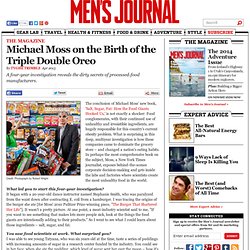
How Junk Food Can End Obesity - David H. Freedman. Late last year, in a small health-food eatery called Cafe Sprouts in Oberlin, Ohio, I had what may well have been the most wholesome beverage of my life.
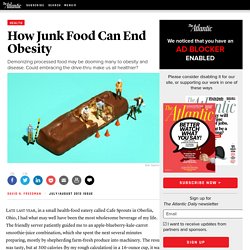
The friendly server patiently guided me to an apple-blueberry-kale-carrot smoothie-juice combination, which she spent the next several minutes preparing, mostly by shepherding farm-fresh produce into machinery. The result was tasty, but at 300 calories (by my rough calculation) in a 16-ounce cup, it was more than my diet could regularly absorb without consequences, nor was I about to make a habit of $9 shakes, healthy or not. Inspired by the experience nonetheless, I tried again two months later at L.A.’s Real Food Daily, a popular vegan restaurant near Hollywood. The second brain in our stomachs. 10 July 2012Last updated at 20:53 ET By Michael Mosley BBC TV Michael Mosley swallows a tiny camera which streams live images of his digestive system.
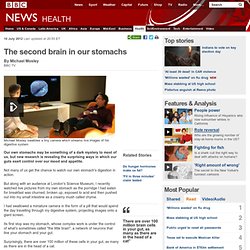
Applied Ethics in Agriculture Socy/Econ course syllabus and readings. Are Savages Noble? On Eating Animals. History of Vegetarianism - What did our ancestors eat? A personal information file by Bronwen Humphries (1994) Introduction -- Time Scale -- Human Descent -- Ramapithecines -- Australopithecines -- Homo Habilis -- Homo Erectus -- Neanderthal Man -- Homo Sapiens Sapiens -- Early Agriculture -- Middle Ages -- What Were People Programmed to Eat?
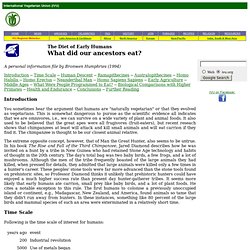
-- Biological Comparisons with Higher Primates -- Health and Endurance -- Conclusions -- Further Reading. Loving Animals to Death - James McWilliams. Cover Story - Spring 2014 Print How can we raise them humanely and then butcher them?

China Study author Colin Campbell slaps down critic. Editor's Note: There has recently been a flurry of discussion prompted by an article by raw-animal-product advocate Denise Minger, which criticizes The China Study and attacks its author, Dr.
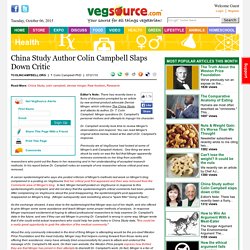
T. Colin Campbell. Minger questions Dr. Campbell's personal motives and attempts to impugn his character. Dr. Magazine - The Perfected Self. B.
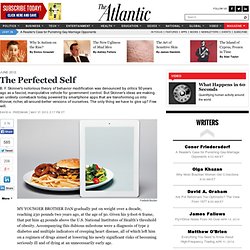
F. Refined dining. Shaped in an age of scarcity, our appetite for sugar, fat and salt now torments us.
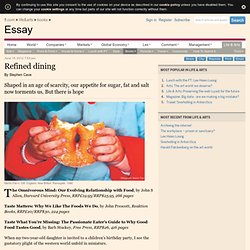
But there is hope ©Magnum/ Martin Parr Martin Parr's 'GB. England. New British. Canaries in the coal mine: a cross-species analysis of the plurality of obesity epidemics. Skip to main page content Proceedings of the Royal Society B: Biological Sciencesrspb.royalsocietypublishing.org Published online before print 24 November 2010 doi: 10.1098/rspb.2010.1890 rspb20101890 + Author Affiliations * Author for correspondence (dallison@uab.edu).
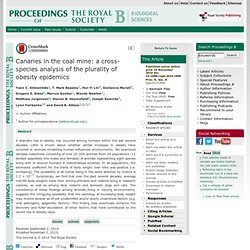
Obesity Pragmatism. Health activists are in a tizzy over sugar and fast food, which they blame for the obesity “epidemic.”
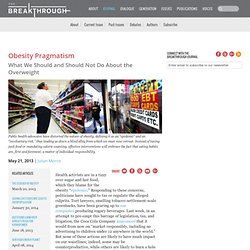
Responding to these concerns, politicians have sought to tax or regulate the alleged culprits. Tort lawyers, smelling tobacco-settlement-scale greenbacks, have been gearing up to sue companies producing sugary beverages. Last week, in an attempt to pre-empt this barrage of legislation, tax, and litigation, the Coca Cola Company announced that it would from now on “market responsibly, including no advertising to children under 12 anywhere in the world.”
The big fat truth. ILLUstration by gary neil Late in the morning on 20 February, more than 200 people packed an auditorium at the Harvard School of Public Health in Boston, Massachusetts. The purpose of the event, according to its organizers, was to explain why a new study about weight and death was absolutely wrong. The report, a meta-analysis of 97 studies including 2.88 million people, had been released on 2 January in the Journal of the American Medical Association ( JAMA ) 1 . A team led by Katherine Flegal, an epidemiologist at the National Center for Health Statistics in Hyattsville, Maryland, reported that people deemed 'overweight' by international standards were 6% less likely to die than were those of 'normal' weight over the same time period. The result seemed to counter decades of advice to avoid even modest weight gain, provoking coverage in most major news outlets — and a hostile backlash from some public-health experts.
Low-Calorie Diet Doesn’t Prolong Life, Study of Monkeys Finds. The results of this major, long-awaited study, which began in 1987, are finally in. But it did not bring the vindication calorie restriction enthusiasts had anticipated. It turns out the skinny monkeys did not live any longer than those kept at more normal weights. Some lab test results improved, but only in monkeys put on the diet when they were old. The causes of death — cancer, heart disease — were the same in both the underfed and the normally fed monkeys. Lab test results showed lower levels of cholesterol and blood sugar in the male monkeys that started eating 30 percent fewer calories in old age, but not in the females.
Rafael de Cabo, lead author of the diet study, published online on Wednesday in the journal Nature, said he was surprised and disappointed that the underfed monkeys did not live longer. But even that study had a question mark hanging over it. How to Really Eat Like a Hunter-Gatherer: Why the Paleo Diet Is Half-Baked [Interactive & Infographic] Meet Grok. According to his online profile, he is a tall, lean, ripped and agile 30-year-old. By every measure, Grok is in superb health: low blood pressure; no inflammation; ideal levels of insulin, glucose, cholesterol and triglycerides. What Graham Crackers Can Teach Us About Whole Foods. (Jeffrey Hamilton/Thinkstock) Leaving the farmers’ market every Saturday, I am filled with self-satisfaction.
Not only have I managed to accomplish some food shopping (a tricky feat for busy people), but I also imagine that I have participated in the political project of “the food movement.” In this fantasy, the First Lady, Michael Pollan, and Mark Bittman regard me with approval. This zeal fades quickly as the fruit flies come to feast on the tomatoes that I never seem to eat fast enough, and as I cave after a long day and dig into an ice-cream bar made with unpronounceable ingredients.
The Michelin guide and its undercover inspectors. One afternoon last month, a woman in her early thirties, with shoulder-length blond hair and large brown eyes, arrived at Jean Georges, on the ground floor of the Trump International Hotel, in midtown Manhattan. The restaurant, which is owned by the chef Jean-Georges Vongerichten, and is one of the highest rated in the world, has an understated décor, with bare white walls and floor-to-ceiling windows.
The woman took a seat at one of the tables in the center of the room. She wore a light-blue dress with a high neckline, little makeup, and no jewelry. There was nothing remarkable about her appearance, and her demeanor was quiet and unassuming, as if designed to deflect attention—a trait indispensable for her profession as an inspector for the Michelin hotel-and-restaurant guide. What’s Wrong With the Michelin Guide? Everything, Says A. A. Gill. Wine-tasting: it's junk science. Last Meals. Essays. Pink is the New Green: Soylent Never Goes Out of Style. When the science-fiction film Soylent Green was released in 1973, critics celebrated everything about it except the premise. New York Times film critic A.H. Weiler declared that the movie’s twenty-first century setting was “occasionally frightening but…rarely convincingly real.”[1] How could a population unwittingly eat and enjoy human remains in the form of the popular food product, Soylent Green?
Everything You Always Wanted to Know About Big Ag. The Naked Truth: Why Humans Have No Fur. Among primates, humans are unique in having nearly naked skin. 12/18/12 - we used to sleep twice each night. Dept. of Entomology: Stung. The Coldscape. Why Fire Makes Us Human. Human evolution: Kissing cousins. The Link Between Your Diet and Bugs that Live in Your Gut. Michael Specter: Exploring the Human Microbiome. Whey Too Much: Greek Yogurt's Dark Side. Archaeology: The milk revolution. Gut feelings: the future of psychiatry may be inside your stomach. Comparison with ancestral diets suggests dense acellular carbohydrates promote an inflammatory microbiota, and may be the primary dietary cause of leptin resistance and obesity.
Popular Antibiotics May Carry Serious Side Effects. When You Swallow A Grenade. Deadly 'superbugs' invade U.S. health care facilities. The Fat Drug. The Purest of Them All.